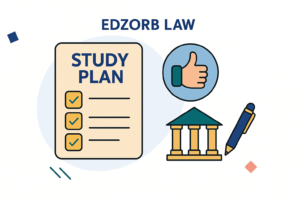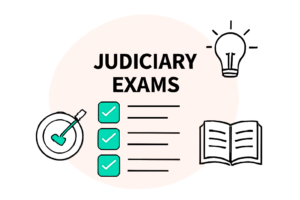A strong legal vocabulary is essential for judiciary aspirants. It’s not just a skill but a superpower that can set you apart in exams and legal practice. At Edzorb Law, we believe that mastering legal language is the cornerstone of success for every future judge and legal professional.
1. Read Extensively – Let the Law Speak to You

Focus Areas
- Landmark Judgments: Real-world use of legal reasoning.
- Legal Textbooks: Explore Criminal, Constitutional, and Contract Law for vocabulary goldmines.
Edzorb Tip
- Use the Edzorb Law Judiciary App to access curated landmark judgments with simplified explanations and highlighted legal phrases.
2. Use Flashcards – Small Cards, Big Results
How to Use Flashcards
- One side: Legal Term
- Other side: Definition + Example
Edzorb Pro Tip
- Access pre-built flashcard decks on the Edzorb Law App, specifically tailored for judiciary preparation.
3. Engage in Legal Writing – Learn by Doing
Practice Through Writing
- Case Briefs: Summarize key points using precise legal language.
- Legal Memos: Write strong arguments and practice using legal terminology.
Edzorb Tip
- Practice legal drafting modules on Edzorb Law and get feedback from mentors.
4. Debate Like a Litigator – Speak Legal, Think Legal
How to Prepare
- Participate in legal debates and mock court sessions to practice legal language in real-time environments.
- Sharpen skills like quick thinking, precise articulation, and confident argumentation.
Edzorb Tip
- Join Edzorb Law Mock Tests and Peer Challenges on the app to stay sharp.
5. Learn Legal Maxims & Latin Phrases – Speak the Language of Law

Essential Maxims to Learn
- Mens Rea (Guilty Mind)
- Stare Decisis (To Stand by Things Decided)
- Res Ipsa Loquitur (The Thing Speaks for Itself)
Edzorb Hack
- Access our Legal Maxims Dictionary with visual cues and usage examples in the Edzorb app.
6. Use Legal Dictionaries – Your Daily Companion
Key Legal Resources
- Keep a Black’s Law Dictionary or the Edzorb Law Glossary handy for quick reference.
- Every unfamiliar word? Look it up, learn it, and use it.
Bonus
- Visit the Legal Information Institute (LII) or explore Edzorb’s in-app glossaries for quick definitions.
7. Practice with Past Papers – Exam-Proof Your Vocabulary
How to Practice
- Solve previous years’ judiciary papers to familiarize yourself with commonly tested legal terms.
- Use the right term in the right context to gain precision in your answers.
Edzorb App Exclusive
- Topic-wise PYQs, sample answers, and legal vocabulary highlights included on the Edzorb app.
Conclusion: Vocabulary is Victory; Make It Happen with Edzorb!
Improving legal vocabulary isn’t just about memorizing terms; it’s about understanding, using, and mastering the language of law. With consistent effort, the right strategy, and Edzorb’s expert-backed tools, you’ll gain the legal fluency to stand out in exams and in court.
Download the Edzorb Judiciary App Today and turn your vocabulary into a weapon of legal mastery!

 Podcast
Podcast








 Features
Features






